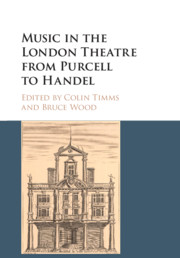Book contents
- Frontmatter
- Contents
- List of Figures
- List of Music Examples
- Notes on Contributors
- Preface
- Introduction
- I FROM PURCELL TO HANDEL
- 1 Purcell's ‘Scurvy’ Poets
- 2 Opera as Literature and the Triumph of Music
- 3 The British Enchanters and George Granville's Theory of Opera
- 4 Lost Chances: Obstacles to English Opera for Purcell and Handel
- 5 Alexander's Feast, or The Power of Perseverance: Dryden's Plan for English Opera and its Near-fulfilment in a Handel Ode
- II HANDEL AND ITALIAN OPERA
- III HANDEL AND ENGLISH WORKS IN THE THEATRE
- Bibliography
- Index
3 - The British Enchanters and George Granville's Theory of Opera
from I - FROM PURCELL TO HANDEL
Published online by Cambridge University Press: 10 June 2017
- Frontmatter
- Contents
- List of Figures
- List of Music Examples
- Notes on Contributors
- Preface
- Introduction
- I FROM PURCELL TO HANDEL
- 1 Purcell's ‘Scurvy’ Poets
- 2 Opera as Literature and the Triumph of Music
- 3 The British Enchanters and George Granville's Theory of Opera
- 4 Lost Chances: Obstacles to English Opera for Purcell and Handel
- 5 Alexander's Feast, or The Power of Perseverance: Dryden's Plan for English Opera and its Near-fulfilment in a Handel Ode
- II HANDEL AND ITALIAN OPERA
- III HANDEL AND ENGLISH WORKS IN THE THEATRE
- Bibliography
- Index
Summary
In the first edition of the encyclopaedia Die Musik in Geschichte und Gegenwart the article on ‘opera’ by Anna Amalie Abert (1962) began with a clear-cut definition of the term:
Eine Oper im weitesten Sinne des Begriffs ist eine wie immer geartete Bühnenhandlung, die entweder ganz oder in wesentlichen Teilen in Musik gesetzt ist; dabei muß diese Handlung von vornherein auf die Mitwirkung der Musik hin erfunden bzw. im Hinblick auf sie bearbeitet sein.
An opera in the broadest sense of the word is a stage play of whatever kind which is entirely or substantially set to music; the play must either be invented from the outset for the involvement of music or be revised for this purpose.
In the Supplement of the second edition of the same encyclopaedia a new article on ‘opera’ appeared. The authors of this article, Silke Leopold and Dörte Schmidt (2008), emphasise the point that no explicit definition of opera can be given and that the term has been dissolved in a flood of different uses during the history of European music:
Oper ist kein Gattungsbegriff, sondern ein diffuser Name für unterschiedliche Formen des europäischen bzw. europäisch geprägten musikalischen Theaters ab ca. 1600, in zweiter Linie auch für die zu dessen Aufführung bestimmten Bauwerke. Die Verwendung des Begriffs ist weniger durch terminologische Stringenz und spezifische Definitionen gekennzeichnet als durch pragmatischen, zuweilen auch polemischen Sprachgebrauch. Daher lässt sich seine Bedeutung historisch eher über die Kontexte solchen Gebrauchs als durch definitorische Setzungen oder von einer normativen Gattungspoetik her erschließen.
Opera is not a generic term but a diffuse designation for various forms of European musical theatre from 1600 on and also, in a secondary sense, for the buildings intended for their performance. The application of the word is characterised less by terminological consistency or specific definitions than by a pragmatic and sometimes polemical usage. Therefore its meaning throughout history should be reconstructed rather from the contexts of its use than from definitions or from a normative poetics of genre.
If this is the case, what we should do before deciding whether to label a phenomenon an opera is to reconstruct as exactly as possible the historical situations in which the term was originally used.
- Type
- Chapter
- Information
- Music in the London Theatre from Purcell to Handel , pp. 38 - 48Publisher: Cambridge University PressPrint publication year: 2017



